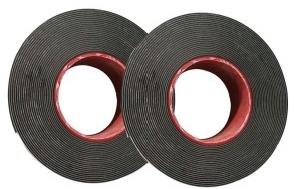The Versatility and Applications of Butyl Gum Tape
Butyl gum tape, often referred to simply as butyl tape, is an incredibly versatile adhesive product that has garnered popularity in various industries due to its excellent sealing and waterproofing properties. This specialized tape is made from butyl rubber, a synthetic rubber that is renowned for its resilience and adhesive capabilities. In this article, we will explore the unique characteristics of butyl gum tape, its applications, and why it is an invaluable tool in construction, automotive, and manufacturing industries.
Characteristics of Butyl Gum Tape
One of the standout features of butyl gum tape is its remarkable adhesion. It can stick to a wide variety of surfaces, including metal, plastic, glass, and concrete. This makes it ideal for applications where a strong bond is essential. Additionally, butyl gum tape remains flexible and does not become brittle over time, even when exposed to temperature fluctuations and UV light. This resilience ensures a long-lasting seal that maintains its effectiveness in various environmental conditions.
Another significant benefit of butyl gum tape is its waterproofing abilities. It is impervious to moisture, which is crucial for many sealing applications. When properly applied, butyl tape creates a watertight seal that prevents leaks, making it a popular choice in roofing, plumbing, and automotive applications. Furthermore, butyl gum tape is resistant to aging, enabling it to withstand the elements for extended periods without losing its adhesive properties.
Applications of Butyl Gum Tape
butyl gum tape

1. Roofing and Construction In the construction industry, butyl gum tape is widely used for sealing roofs and building materials. It can be employed to seal joints, seams, and flashing, creating a barrier against water infiltration. The flexibility and durability of butyl tape make it ideal for use in both new construction projects and repairs. Roofers appreciate its ease of application and the peace of mind it offers by preventing leaks.
2. Automotive Industry Butyl gum tape is also prevalent in the automotive sector, where it is used for sealing windshields, side windows, and sunroofs. Its ability to withstand harsh weather conditions and vibrations makes it an excellent choice for automotive applications. Furthermore, butyl tape is often used in the assembly of vehicle components, where a strong and durable adhesive is required.
3. Manufacturing In manufacturing settings, butyl gum tape serves various purposes, including insulation, vibration dampening, and sealing. It can be used to create gaskets and seals for machinery, providing protection against dust and moisture. The tape's versatility allows it to be utilized in a wide range of products, from appliances to electronic devices.
4. DIY Projects Beyond industrial applications, butyl gum tape is a favorite among DIY enthusiasts and homeowners. Whether repairing leaky pipes, sealing windows, or reinforcing outdoor fixtures, butyl tape offers an effective and easy-to-use solution. Its availability in different widths and colors also allows for creative applications in arts and crafts projects.
Conclusion
In conclusion, butyl gum tape is a remarkable adhesive product that combines versatility, durability, and effectiveness. Its unique properties make it indispensable across various industries, from construction and automotive to manufacturing and DIY. As technology advances, butyl tape continues to evolve, finding new applications and solutions to meet the demands of both professionals and everyday users. With its ability to provide strong, waterproof seals, it is no wonder that butyl gum tape remains a go-to adhesive option for so many. Whether you are sealing a roof, fixing a car, or tackling a home project, butyl gum tape is a reliable choice that promises lasting performance.
-
XIANGFAN Rubber Tape-Ultimate Solutions for All Your Insulation NeedsNewsJun.24,2025
-
XIANGFAN Rubber Tape-Protection for Industrial and Residential ApplicationsNewsJun.24,2025
-
XIANGFAN Rubber Tape: Superior Safety and Sealing for Demanding EnvironmentsNewsJun.24,2025
-
XIANGFAN Rubber Tape: Reliable Solutions for Every Electrical ChallengeNewsJun.24,2025
-
XIANGFAN Electrical & Industrial Tape: Powering Reliability Across IndustriesNewsJun.24,2025
-
XIANGFAN Electrical & Industrial Tape: Excellence in Every ApplicationNewsJun.24,2025
